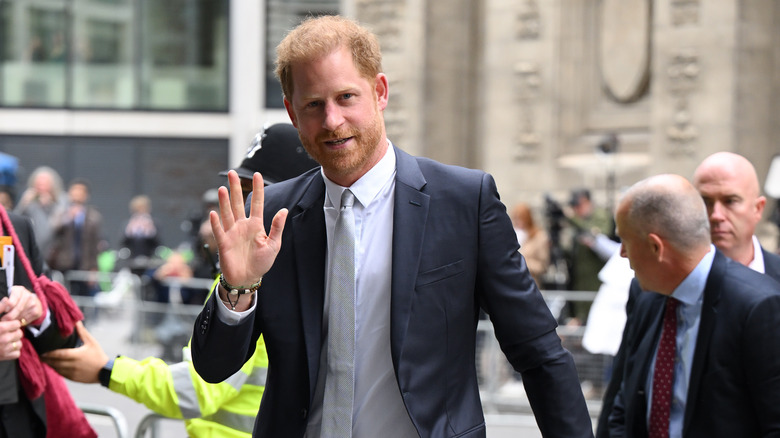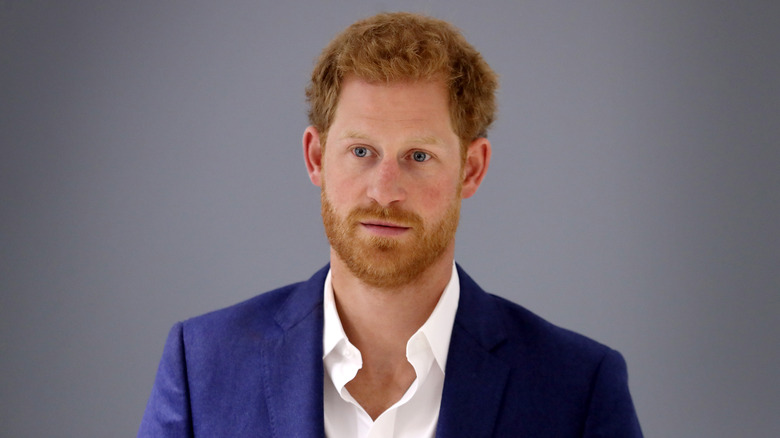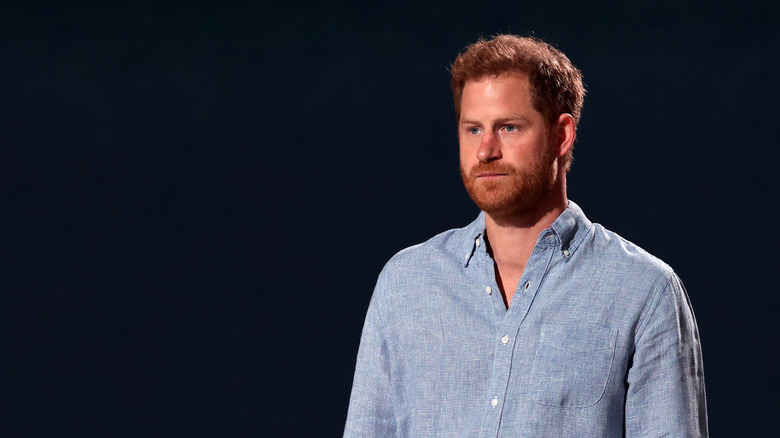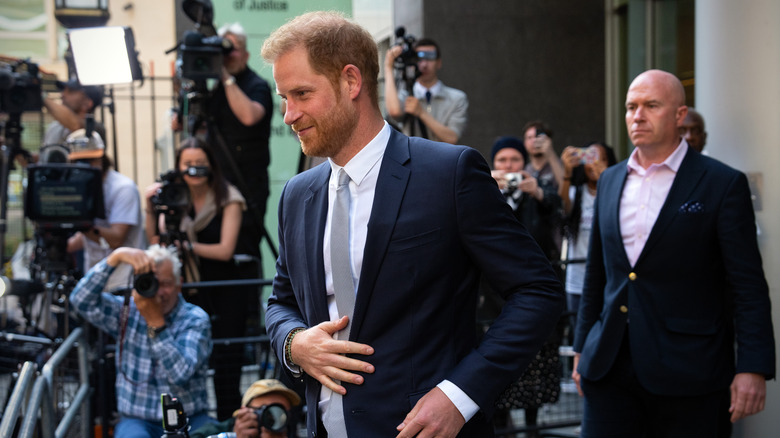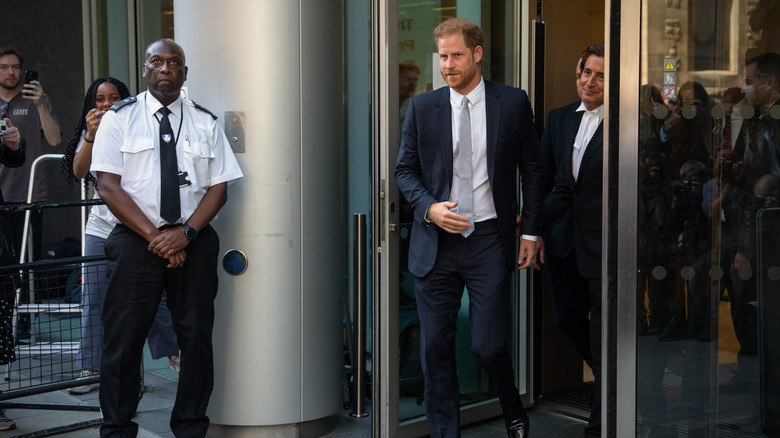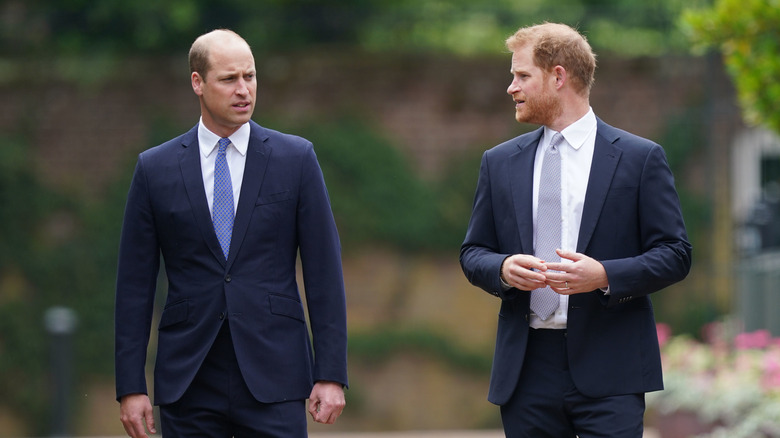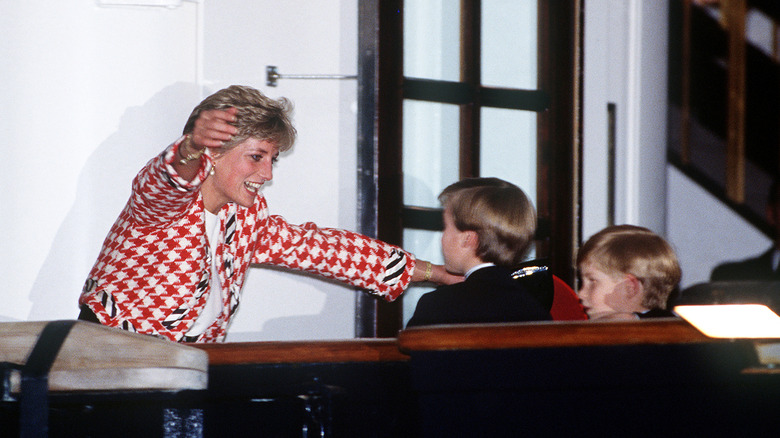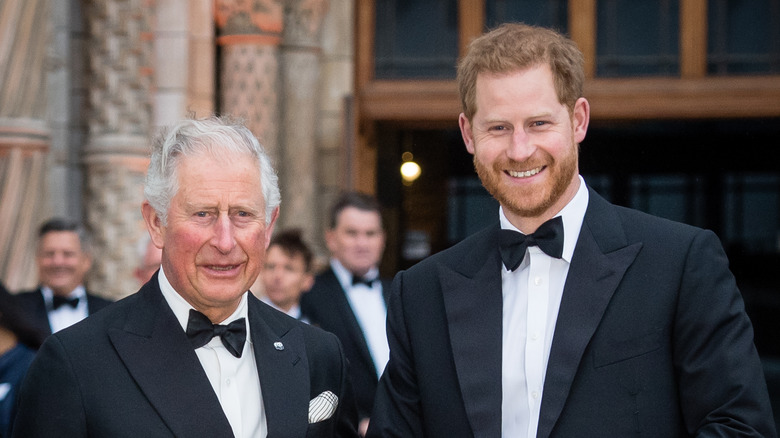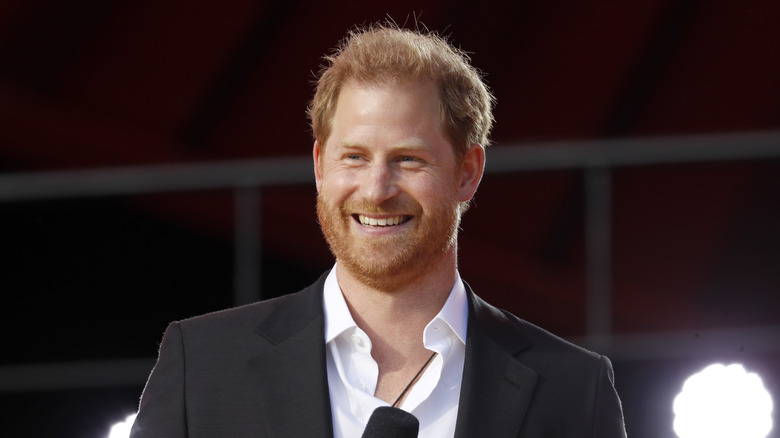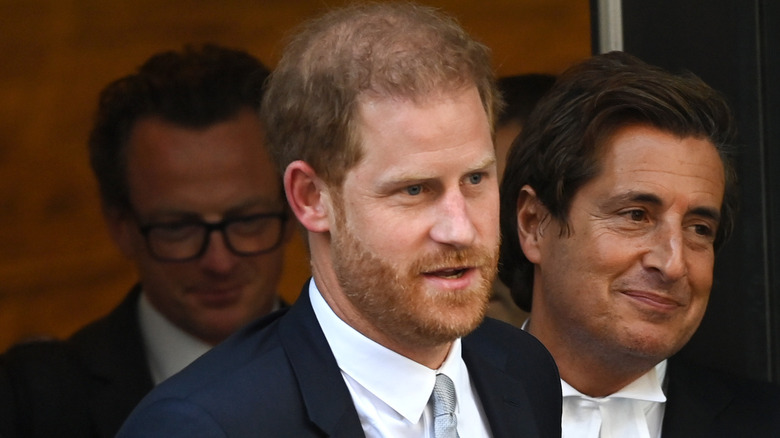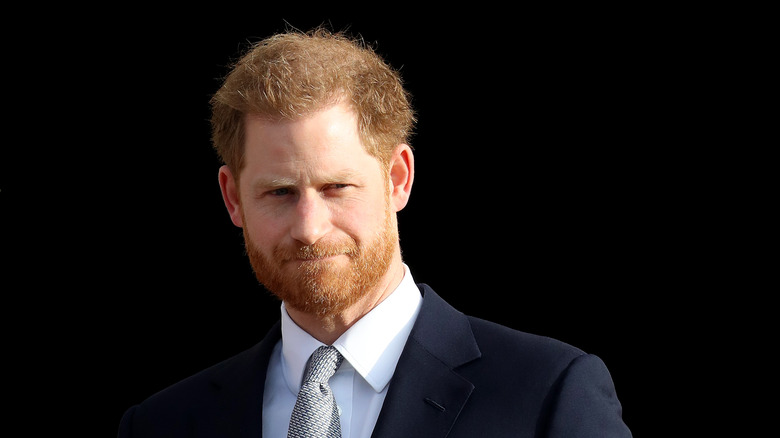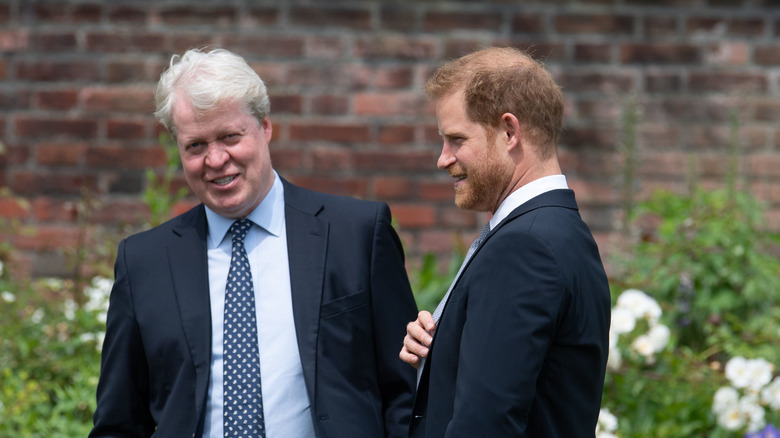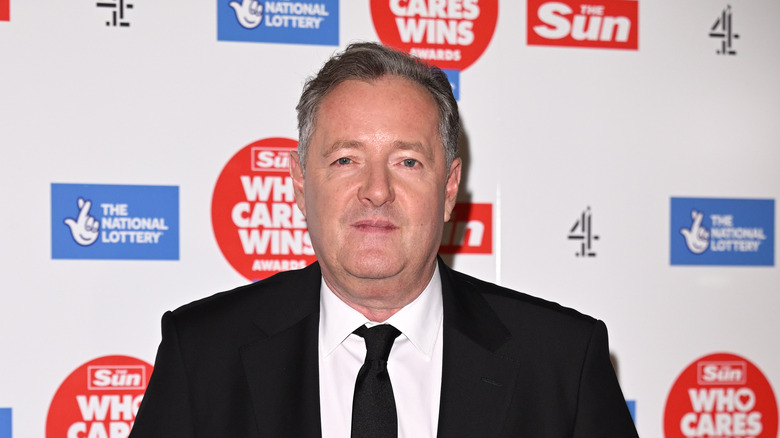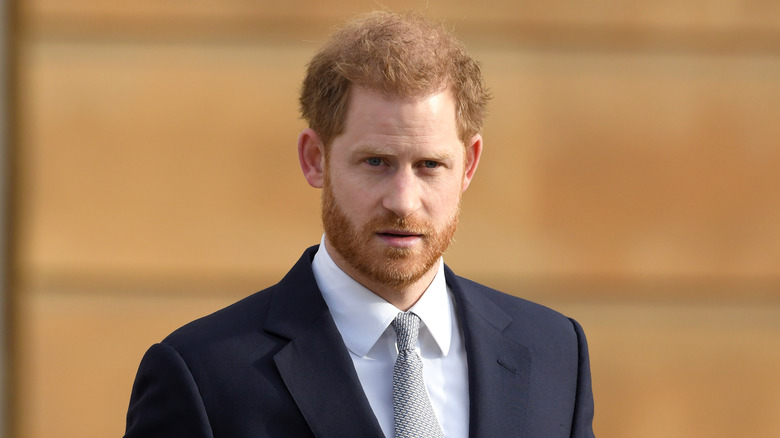Inside Prince Harry's Fight With Mirror Group Newspapers
Since leaving his post as a senior member of the royal family in January 2020, Prince Harry has certainly been at war. While many would assume that it's the feud between Prince William and him we're referring to, the battle between the brothers is just a piece of the puzzle. What Harry has instead focused on more and more as his time outside of the royal firm takes hold is the palace press offices and the allegedly sordid relationship they share with the royal rota — a collection of British tabloid newspapers that have historically printed fantastical and anonymous reports about the family.
Such invasive tactics at the hands of the British press are nothing new. Princess Diana, Harry's late mother, was consistently a target of the paparazzi, with her own experience at the hands of the press largely examined by way of documentary, memoir, and news reports. Her death in 1997 was the result of paparazzi involvement, leaving a then 12-year-old Harry to face the music without his mom. What has transpired since is a prince in the headlines with little to no say in what is printed about him — Harry has certainly had enough.
In a landmark case playing out in real-time, Harry and several other plaintiffs are going up against Mirror Group Newspapers, alleging that phone hacking and other illegal activity took place over an extended period to help serve the reporting process. Here's everything we know about his fight.
What has Harry said about the royal rota in the past?
Before we dive into what Prince Harry said about this litigation, context is key. While Harry and Meghan Markle maintain they stepped back from royal life to strike out on their own both financially and professionally, they have — with time — exposed more truths about the royal family. They have also spoken about the processes in which the palace takes part to further the relationships they share with the royal rota. As part of their Netflix docuseries, "Harry & Meghan," they spoke more about the mutually beneficial bond between the firm and the tabloid press, with Harry alleging that reports were fabricated by the royal press offices in order to serve the royal family's image and hierarchical dynamic.
"There's a hierarchy of the family. You know, there's leaking, but there's also planting of stories," Harry said on-camera. Meghan added, "The truth didn't matter, the clickbait did."
Meanwhile, Harry claimed that members of the royal family told him that Meghan simply needed to embrace the press scrutiny she — and Harry — were facing, telling him that it was just part of the experience. "It was almost like a rite of passage, and some of the members of the family were like, 'My wife had to go through that, so why should your girlfriend be treated any differently?'" Of course, the racial component and the invasive practices made Harry and Meghan's treatment a different experience to endure.
Harry's case alleges phone hacking
At the heart of Prince Harry's case against Mirror Group Newspapers are allegations of phone hacking and invasion of privacy. The Duke of Sussex claimed that between 1991 and 2011, the owners of The Sunday People, The Daily Mirror, and The Sunday Mirror used illegal methods to obtain personal — and often fault-finding — information about him. Within that time, Harry's mother died, the prince started dating, his party habits and substance use were heightened, and his military service unfolded — many of these aspects were brought up within the case, specifically his relationship with ex-girlfriend Chelsy Davy.
Bringing forth 33 specific stories as part of his case, Harry focused on information that he claimed could have only been obtained as the result of illegal methods like phone hacking. In addition, his case claimed that not only were these practices in place by the news group, but that executives knew about it. Harry's litigation marked the first time a royal made it to court since 1891, and all eyes were on him as a result.
Speaking to the consequences of Harry's litigation, royal commentator Richard Fitzwilliams told Time, "Clearly the royal family's avoidance of court appearances is linked to the concern that anything can, in theory, be raised in a court. There is obviously concern that issues dealing with the royal family's relationship with the press will be raised. Harry has claimed there is collusion between them."
How did Mirror Group respond to Harry's initial allegations?
As part of Prince Harry's case, the aforementioned 33 stories were central to his argument. In addition, the lawsuit took aim at Piers Morgan, who has been known to harshly criticize Harry and Meghan Markle amid their exit from royal life and the establishment of their post-royal tactics. Before he was a television personality, Morgan worked as the editor of The Mirror, serving in his post from 1995 until 2004 — a large portion of the time Harry focused on in his case.
Harry's claims and evidence certainly appeared damning from the start, and Mirror Group Newspapers had an interesting response to his allegations. Firstly, the publisher asserted that its reporting was gathered using ethical journalistic practices, shooting down the claim that phone hacking was utilized. However, the newspaper group issued an apology regarding an incident in which a private investigator was hired by the tabloids to dig into Harry. The investigator's efforts informed an article entitled "Sex on the beach with Harry," which ran in 2004.
While Mirror Group Newspapers quickly asserted that phone hacking was not a tactic used in this case, it should be noted that the publishers have already dished out $125 million in case settlements over the years, and The Mirror issued a public apology to phone hacking victims in 2015.
Harry traveled to London to enter the witness box
In an interesting parallel experience, Prince William settled a phone-hacking case with News Group Newspapers in 2020, receiving a large cash settlement and avoiding a court appearance in the process. Such a settlement, however, was not Prince Harry's preferred outcome — he has made it clear that he is going after the royal rota and the relationships shared with the royal press office as a system. So, in an unprecedented move, Harry made the trip from California to the United Kingdom to face Mirror Group Newspapers in court, relying on the legal mind of lawyer David Sherborne and presenting his allegations in the process.
Though the period which Harry's allegations included has since passed, the Duke of Sussex explained in court that he was motivated to pursue litigation now after crossing paths with his attorney, resulting in the two conversing about methods to "stop the abuse, intrusion, and hate that was coming towards me and my wife" (via CNBC).
"I believe phone hacking was on an industrial scale across at least three of the papers at the time, and that is beyond doubt," Harry alleged as he entered the witness box in the highly watched case, adding that he would "feel some injustice" if a verdict were to come back in favor of Mirror Group Newspapers (via Reuters).
The royal family was said to be nervous about the information Harry would share in court
As Prince Harry geared up to give evidence against Mirror Group Newspapers, concerns within the palace began to increase, given the sensitive nature of the topic and the palace's own role in the royal rota/press office relations. Not only has the publisher's lawyer, Andrew Green, said that the 33 stories at the center of Harry's complaint "came from information disclosed by or on behalf of royal households or members of the royal family," but palace sources also told Page Six that the Duke of Sussex's testimony would surely widen the gap between himself and Prince William.
"Harry would see himself as fighting their battle too, to protect the reputation of the monarchy," another source explained, noting that the royals themselves probably don't see it that way. "But certainly, they [the royal family] avoid confrontation with the media in most instances," they continued. "And litigation is so lengthy, stressful, and unpredictable, not to mention expensive."
Yet another palace source put it in even blunter terms. "I can't imagine anyone is pleased," they told Page Six, noting that the members of the firm were "privately bracing themselves" for what Harry would say while answering questions.
The prince discussed the death of his mother and the press' involvement in court
As Prince Harry testified, he spoke to a number of experiences relating to the royal rota, the press coverage he received throughout his life, and the private information that he suspected was obtained through illegal means. But, in a more emotional moment, Harry spoke about the experiences that his mother, Princess Diana, had at the hands of the paparazzi during her lifetime, which were horrific and incredibly invasive. Asserting that the publishers and powers behind the royal rota outlets have "blood on their hands," Harry placed the blame for his mother's death directly on the press outlets, noting in a written statement delivered to the court, "How much more blood will stain their typing fingers before someone can put a stop to this madness?" (via NBC News).
Once he spoke in court, Harry became even more poignant in his assertion, focusing on "some of the editors and journalists that are responsible for causing a lot of pain, upset, and in some cases, speaking personally, death."
"At the moment, our country is judged globally by the state of our press and our government — both of which I believe are at rock bottom," Harry said. "Democracy fails when your press fails to scrutinize and hold the government accountable, and instead choose to get into bed with them so they can ensure the status quo."
Harry addressed allegations that King Charles III is not his father during testimony
One of the most rampant rumors that has seemingly been around forever relates to Prince Harry's paternity. Many people assumed — especially given the prince's fiery red hair — that he was not actually King Charles III's son, but rather James Hewitt's, with whom Diana Spencer was said to have had an affair (though the timing doesn't quite line up).
Speaking directly about these accusations and harmful rumors during his time in court, Harry mentioned a specific article published in The Sunday People entitled "Plot to rob the DNA of Harry." Released in 2002, Harry noted that the article in question "reported a plot to steal a sample of my DNA to test my parentage," revealing that such falsehoods resulted in significant mental and emotional harm (via The Daily Beast).
"Numerous newspapers had reported a rumor that my biological father was James Hewitt, a man my mother had a relationship with after I was born," Harry stated. "At the time of this article and others similar to it, I wasn't actually aware that my mother hadn't met Major Hewitt until after I was born. This timeline is something I only learnt of in around 2014, although I now understand this was common knowledge amongst the defendant's journalists." Noting that he was just 18 years old when the initial story was published, Harry maintained that the report was "very damaging and very real to me."
Experts weighed in on Harry's decision to testify after his first day in court
As Prince Harry's first day in court came to a close, royal experts and authors weighed in on his performance in court and the trajectory of the case. Speaking to Fox News Digital, expert Hilary Fordwich offered a rather critical perspective, noting that Harry's court appearance was going "against the grain of everything royal. Prince Harry continues to both complain and wants everyone else to explain. This is a lose-lose situation for him. Barristers in England are the equivalent of litigation attorneys in America. They are trained in cross-examination and brilliant interrogation tactics."
And while Fordwich settled on the idea that Harry would not be able to withstand being cross-examined, author Christopher Andersen gave the Duke of Sussex and his efforts a little bit more credit as day one came to a close.
"Harry's decision to take the stand is brave — that cannot be denied. But is it wise?" Andersen told Fox. "The royal family has always played the long game when it comes to the press. The monarchy is a brand and needs to maintain a working relationship with Britain's tabloids. ... If Harry prevails in this case, it will be a Pyrrhic victory at best. Harry has cast himself in the role of David battling Goliath, but I don't envision this giant going down quite so easily."
Harry was cross-examined in a grueling second court appearance
Just as Hilary Fordwich suspected, Prince Harry was thoroughly cross-examined during his second day in court by the lawyer representing Mirror Group Newspapers, Andrew Green. While his first appearance in court was more measured, Harry's interactions with Green were said to be rather tense, offering lengthy remarks to the lawyer's thorough questions about his own paranoia suffered at the hands of the royal rota.
Speaking about some of the intrusive tactics used to collect stories about himself and the royal family, Harry specifically focused on the use of anonymous sources in the coverage about him. He claimed that by attributing unnamed officials or insiders, reporters were instead hacking his phone or using other methods to access private conversations, thus hiding their alleged tactics behind anonymity.
Though Green was said to have tried to get under the Duke of Sussex's skin, Harry reportedly stayed levelheaded under pressure and didn't share any sordid details about the royal family in the process. After Green tried to poke holes in his account, Harry told the court, "For my whole life, the press misled me, covered up the wrongdoing, and sitting here in court knowing that the [respondents have] the evidence in front of them, and for Mr. Green to suggest I'm speculating ... I'm not sure what to say about that" (via CNN).
Do people care that Harry is going against the royal rota?
While tabloids are by and large ignored as legitimate sources of news by consumers in the United States, they hold a significant amount of power in Britain. This begs the question — does Prince Harry's new homeland care about his ongoing battle with the royal rota? Firm Redfield & Wilton asked this exact question in partnership with Newsweek, questioning 1,500 people in the U.S. about the Duke of Sussex's court appearance and his legal case as a whole. The sample polling found that the majority of those questioned supported Harry's efforts, but didn't care too much about the actual case and what happens as a verdict is reached.
As far as exposure was concerned, Harry doesn't have to worry there. The majority of those questioned had heard about his legal efforts, and more than half said that he was making the right call by taking Mirror Group Newspapers to court. Just 12% of people said that Harry was making a mistake, and when taking politics into consideration, support was extended from both sides of the political aisle.
Here comes whether or not people actually care about the outcome, however. The Newsweek/Redfield & Wilton poll found that 45% of people said that the results didn't matter to them, with an additional 24% saying that it only mattered to them a little bit.
Only one family member has publicly supported Harry amid his efforts
The members of the royal family are known to keep their cards close to their chest, and that has certainly been the case amid Prince Harry's legal battle against Mirror Group Newspapers. No official statement or recognition has occurred from the palace as of publication, and only one family member has publicly expressed support for Harry and his efforts.
Taking to Twitter to bolster his nephew, Charles, Earl Spencer — Diana Spencer's brother — quickly defended Harry when a reporter for The Daily Mail came at the prince during his testimony. "Is Harry still obsessed with former love Chelsy Davy? Harry mentions her 118 times in court evidence, Meghan just five times. No wonder Meg's [sic] didn't show up!" Amanda Platell tweeted. Charles replied, "Pathetic, @amandajplatell — you have no shame, and even less credibility. Last time I heard from you, you were guilty of libeling me, as your employer at @DailyMailUK agreed. Now you're put up (by them?) to misrepresent significant legal evidence as if it was something trivial."
Later, when commenting on the legitimacy of Harry's claims against the publisher, his uncle tweeted that the evidence was "the tens of millions paid out by the @DailyMirror group to those they hacked, to start with. Hope that helps."
Piers Morgan remains a central figure in the court proceedings
Throughout Prince Harry and Meghan Markle's post-royal lives, Piers Morgan has remained a vocal critic of their approach to the media and the information they've shared about the royal family. However, he was an editor employed by Mirror Group Newspapers in the period that is the focus of Harry's case, and as such, he is a central figure as more information comes to light.
Amid Harry's testimony, cross-examination, and the deliberations since, the judge in the case — Justice Fancourt — questioned why Morgan and other journalists employed by the publisher didn't appear in court to bring forth evidence. When doing so, Fancourt noted that Morgan — in addition to other media figures — has had no issue speaking about Harry and the case as a whole publicly, prompting his confusion about their court absence even further. Releasing a list of more than 20 individuals, including former Sunday People editor Neil Wallis and Morgan, Fancourt said, "There's a question in my mind whether any of the individuals on my list could and should have given evidence" (via The Guardian). Fancourt added, "[They] relatively recently had a lot to say about this matter outside of court."
For his part, Morgan has denied having anything to do with the alleged phone hacking, while Wallis faced a trial in 2015 regarding the same accusation at a different paper. He was later found not guilty (per The Guardian).
When will the case reach a verdict?
As with any high-profile case, many have asked when a verdict will be reached amid Prince Harry's efforts. The short answer is not anytime soon. Now that testimonies have concluded and evidence has been presented, Justice Fancourt can now take as much time as needed to come to a conclusion — such a time could span months if necessary. With that in mind, a verdict may not be reached or announced until August or September 2023, though royal watchers will certainly be on the lookout for any update before that estimation. Harry, meanwhile, is back in California with Meghan Markle and their two children, Prince Archie and Princess Lilibet.
When asked how he would feel if Mirror Group Newspapers were let off the hook, Harry said that he would be let down, noting in court, "To have a decision against me and any other people that come behind me with their claims, given that Mirror Group have accepted hacking ... yes, I would feel some injustice" (via Reuters).
If Harry were to be successful in his case, Jim Waterson, The Guardian's media editor, said that the results would be more symbolic for the prince than anything else. "A big payout, however nice, is unlikely to be the main motivation for Harry," Waterson told The Guardian about the impending results.
